|
|
|
Sort Order |
|
|
|
Items / Page
|
|
|
|
|
|
|
| Srl | Item |
| 1 |
ID:
139185
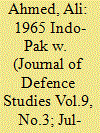

|
|
|
|
|
| Summary/Abstract |
This article seeks to analyse the lessons of the 1965 Indo-Pak war that are applicable today. It finds that the current army doctrine, Cold Start, has some similarities to the opening round of the 1965 war. It argues that even the attritionist strategy adopted in 1965 may have more to give today than the manoeuvre war approach of its more famous successor, the 1971 war. In particular, the article appraises Prime Minister Lal Bahadur Shastri’s firm political control during the war and finds that it was ably reinforced by the prime ministers who were at the helm in India’s later wars. Knowing when to stop is key to avoiding nuclear thresholds, and in that the 1965 war, which stopped short of decisive victory, serves as a suitable precedent to potential future conflicts.
|
|
|
|
|
|
|
|
|
|
|
|
|
|
|
|
| 2 |
ID:
079365
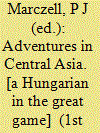

|
|
|
|
|
| Edition |
1st ed.
|
| Publication |
New Delhi, Pentagon Press, 2007.
|
| Description |
xx, 223p.hbk
|
| Standard Number |
9788182743036
|
|
|
|
|
|
|
|
|
|
|
|
Copies: C:1/I:0,R:0,Q:0
Circulation
| Accession# | Call# | Current Location | Status | Policy | Location |
| 052634 | 958/MAR 052634 | Main | On Shelf | General | |
|
|
|
|
| 3 |
ID:
126114
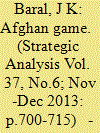

|
|
|
|
|
| Publication |
2013.
|
| Summary/Abstract |
In Afghanistan, the third Great Game is still on. The end of US-NATO combat operations in Afghanistan by the end of 2014 will be read by many as 'Obama's Vietnam', but the retention of a small number of troops and several military facilities by the US in that country will be a source of worry for countries such as Russia, Iran and Pakistan who are concerned about US motives and moves in regard to the region, especially Central Asia's energy resources which are already a target of international competition. India and Pakistan, who suspect each other's motives in regard to Afghanistan, can significantly help it to achieve peace and development by pursuing a cooperative strategy. Their attitudes towards Afghanistan seem to be experiencing a positive change warranting mutual understanding and cooperation.
|
|
|
|
|
|
|
|
|
|
|
|
|
|
|
|
| 4 |
ID:
025332
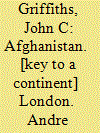

|
|
|
|
|
| Publication |
London, Andre Deutsch, 1981.
|
| Description |
225p.: plates, mapshbk
|
| Standard Number |
0233973508
|
|
|
|
|
|
|
|
|
|
|
|
Copies: C:1/I:0,R:0,Q:0
Circulation
| Accession# | Call# | Current Location | Status | Policy | Location |
| 019898 | 958.1/GRI 019898 | Main | On Shelf | General | |
|
|
|
|
| 5 |
ID:
155021
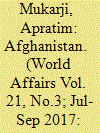

|
|
|
|
|
| Summary/Abstract |
For the last few years the informal Russia–China–Pakistan “axis” active in Afghanistan has been steadily advancing towards ensuring the principal role for itself in determining the future course of the unstable country and in the neighbourhood. Apratim Mukarji however asserts that the path to peace, stability and prosperity continues to be intractable as, behind the facade of a common agenda, the axis powers are busy advancing their respective interests.
|
|
|
|
|
|
|
|
|
|
|
|
|
|
|
|
| 6 |
ID:
030537
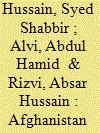

|
|
|
|
|
| Publication |
Islamabad, World Affairs Publications, 1980.
|
| Description |
208p.pbk
|
|
|
|
|
|
|
|
|
|
|
|
Copies: C:1/I:0,R:0,Q:0
Circulation
| Accession# | Call# | Current Location | Status | Policy | Location |
| 018925 | 958.1/HUS 018925 | Main | On Shelf | General | |
|
|
|
|
| 7 |
ID:
139184
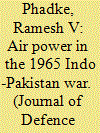

|
|
|
|
|
| Summary/Abstract |
The 1965 Indo-Pak War came when India was in the midst of a major military expansion. India did not want to escalate matters when Pakistani forces invaded Kutch in April 1965 and accepted a ceasefire with British mediation. Although the government allowed the use of Indian Air Force (IAF) combat aircraft on 1 September 1965, action remained localised to the Chhamb area for five days. This was primarily because of India’s desire to avoid all-out war. IAF was used for counter air, air defence, and in support of the ground forces. Poor communications with the Army, lack of joint planning, an almost total absence of early warning and ground controlled interception (GCI) radars meant that its overall performance was sub-optimal. Despite these self-imposed restraints, India succeeded in thwarting Pakistan’s efforts to grab Jammu and Kashmir (J&K) by force, and to that extent the war did become a limited victory for India.
|
|
|
|
|
|
|
|
|
|
|
|
|
|
|
|
| 8 |
ID:
156354
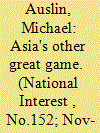

|
|
|
|
|
| Summary/Abstract |
THE SPECTER of the world’s two strongest nations competing for power and influence has created a convenient narrative for pundits and observers to claim that Asia’s future, perhaps even the world’s, will be shaped, in ways both large and small, by the United States and China. From economics to political influence and security issues, American and Chinese policies are seen as inherently conflictual, creating an uneasy relationship between Washington and Beijing that affects other nations inside Asia and out.
|
|
|
|
|
|
|
|
|
|
|
|
|
|
|
|
| 9 |
ID:
070930
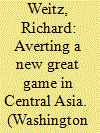

|
|
|
|
|
| Publication |
2006.
|
| Summary/Abstract |
Concerns about a renewed great game are exaggerated. The vital national interests of the most important external countries are not at stake, but competitive pressures, unless restrained, do risk impeding opportunities for cooperation among them.
|
|
|
|
|
|
|
|
|
|
|
|
|
|
|
|
| 10 |
ID:
152173
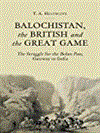

|
|
|
|
|
| Publication |
London, C Hurst and Co. (Publishers) Ltd., 2015.
|
| Description |
xiii, 292p.hbk
|
| Standard Number |
9781849044790
|
|
|
|
|
|
|
|
|
|
|
|
Copies: C:1/I:0,R:0,Q:0
Circulation
| Accession# | Call# | Current Location | Status | Policy | Location |
| 058990 | 954.0312/HEA 058990 | Main | On Shelf | General | |
|
|
|
|
| 11 |
ID:
154797
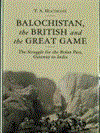

|
|
|
|
|
| Edition |
Indian ed.
|
| Publication |
New Delhi, Pentagon Press, 2015.
|
| Description |
xiii, 292p.hbk
|
| Standard Number |
9789386618061
|
|
|
|
|
|
|
|
|
|
|
|
Copies: C:1/I:0,R:0,Q:0
Circulation
| Accession# | Call# | Current Location | Status | Policy | Location |
| 059159 | 954.0312/HEA 059159 | Main | On Shelf | General | |
|
|
|
|
| 12 |
ID:
139181
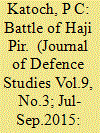

|
|
|
|
|
| Summary/Abstract |
In 1965, Pakistan attempted infiltration into Jammu and Kashmir (J&K), with Operation Gibralter, followed by a planned capture of Akhnoor Bridge under Operation Grand Slam. While Operation Gibraltar was bold from the point of view of multi-directional infiltration, it was largely based on the utopian dream of President Ayub Khan and Foreign Minister Zulfiqar Ali Bhutto, ignoring the ground realities that J&K’s population would not support it. The Indian reaction was swift and included the epic capture of the strategic Haji Pir Pass at a height of 2,637 metres (m) on the formidable Pir Panjal Range that divided the Srinagar valley from the Jammu region. The pass has been a constant source of problems since Pakistan-trained militants have been sneaking into the Kashmir Valley, Poonch and Rajouri districts. Ironically, the Haji Pir Pass, captured through a heroic and daring action, had to be returned to Pakistan under the Tashkent Agreement.
|
|
|
|
|
|
|
|
|
|
|
|
|
|
|
|
| 13 |
ID:
153584
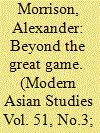

|
|
|
|
|
| Summary/Abstract |
Drawing on published documents and research in Russian, Uzbek, British, and Indian archives, this article explains how a hasty attempt by Russia to put pressure on the British in Central Asia unintentionally triggered the second Anglo–Afghan War of 1878–80. This conflict is usually interpreted within the framework of the so-called ‘Great Game’, which assumes that only the European ‘Great Powers’ had any agency in Central Asia, pursuing a coherent strategy with a clearly defined set of goals and mutually understood rules. The outbreak of the Second Anglo–Afghan war is usually seen as a deliberate attempt by the Russians to embroil the British disastrously in Afghan affairs, leading to the eventual installation of ‘Abd al-Rahman Khan, hosted for many years by the Russians in Samarkand, on the Afghan throne. In fact, the Russians did not foresee any of this. ‘Abd al-Rahman's ascent to the Afghan throne owed nothing to Russian support, and everything to British desperation. What at first seems like a classic ‘Great Game’ episode was a tale of blundering and unintended consequences on both sides. Central Asian rulers were not merely passive bystanders who provided a picturesque backdrop for Anglo–Russian relations, but important actors in their own right.
|
|
|
|
|
|
|
|
|
|
|
|
|
|
|
|
| 14 |
ID:
072327
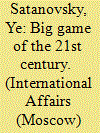

|
|
|
| 15 |
ID:
124876
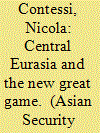

|
|
|
|
|
| Publication |
2013.
|
| Summary/Abstract |
In the 20 years since independence from the former Soviet Union, the study of Eurasia in International Relations (IR) has received considerable impetus in both the academic and policy circles. Specialized news and analysis outlets have come online, research centers have multiplied within universities, and a variety of think tanks now host dedicated programs. In other words, this still relatively little-known region has glamour. Yet Eurasia remains difficult to situate as an object of study due to its distinctive hybridity: geographical, at the crossroads between Europe and Asia; cultural, Muslim Russianspeaking Turkic peoples with Asian traits and traditions; political, straddling Western and Asian institutional forms domestically, and contiguous to Europe, Asia, Russia, the Middle East, and Afghanistan internationally. Partly as a result of this hybridity, Eurasia is a somewhat elusive object of study. At a minimum, it comprises the two subregions on each shore of the Caspian basin: Central Asia to the east and the Caucasus to the west. Reflecting this elusiveness, Central Asian states (CAS) belong to the Asia-Pacific Regional Group at the United Nations; they are members of the Asian Development Bank and the Economic Commission for the Asia-Paci?c. At the same time, they are members of the Organization for Security and Cooperation in Europe (OSCE), the European Bank for Reconstruction and Development, and the Euro-Atlantic Partnership Council, a North Atlantic Treaty Organization (NATO) ancillary forum. But they also have distinctly Central Asian groupings, such as the Eurasian Development Bank, the UN-af?liated Central Asian Regional Information and Coordination Center, not to mention the Shanghai Cooperation Organization (SCO) and Collective Security Treaty Organization (CSTO). Similarly, the three Caucasian states share most of the same af?liations, except for belonging to the East European Regional Group at the UN
|
|
|
|
|
|
|
|
|
|
|
|
|
|
|
|
| 16 |
ID:
075494
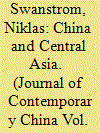

|
|
|
|
|
| Publication |
2005.
|
| Summary/Abstract |
Central Asia and China have been closely intertwined in history and today that relationship has begun to re-emerge. This article analyses the reasons for the close cooperation which has re-emerged in the 1990s and boomed in the twenty-first century. Domestic and internal factors, as well as political and economic considerations are included in the search for an explanation for current relations and future expectations. Despite the fact that China has emerged as one of the world's most powerful states, its dependence on the Central Asian states in regard to oil and gas but also domestic security is intriguing. The future of Sino-Central Asian relations is deeply embedded in joint problems and common interests, but also in fear of domination and external intervention.
|
|
|
|
|
|
|
|
|
|
|
|
|
|
|
|
| 17 |
ID:
139183
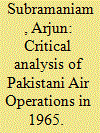

|
|
|
|
|
| Summary/Abstract |
This article tracks the evolution of the Pakistan Air Force (PAF) into a potent fighting force by analysing the broad contours of joint operations and the air war between the Indian Air Force (IAF) and PAF in 1965. Led by aggressive commanders like Asghar Khan and Nur Khan, the PAF seized the initiative in the air on the evening of 6 September 1965 with a coordinated strike from Sargodha, Mauripur and Peshawar against four major Indian airfields, Adampur, Halwara, Pathankot and Jamnagar. The IAF riposte to PAF strikes came early next morning at dawn on 7 September. Over the next ten days, IAF surprised an overconfident PAF with its tenacity and individual combat proficiency. The article concludes by offering a critical analysis of the opeational performance of PAF in the conflict and an objective qualitative comparison with the performance of the IAF.
|
|
|
|
|
|
|
|
|
|
|
|
|
|
|
|
| 18 |
ID:
174896
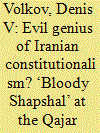

|
|
|
|
|
| Summary/Abstract |
Late Imperial Russia’s multifaceted presence in Persia retains many fascinating life-stories of its actors, who often exerted crucial influence on the course of the history of Russian-Iranian relations of the time. Drawing on international scholarship about the Russian-Iranian relationships at the turn of the twentieth century, but mostly on documents from Russian and Georgian archives and the diaries of his contemporaries as well as his own private notes, this article examines the activities of Seraia Shapshal (1873–1961), focusing on his embeddedness both in the Qajar court and in Late Imperial Russia’s policy towards Iran during the period 1900 to 1908. The paper for the first time in Iranian studies sheds light in sufficient detail upon how Shapshal found himself in Persia and what enabled him to reach the highest levels of power at the Qajar court. In so doing, it also identifies his leading role in the June 1908 anti-constitution coup.
|
|
|
|
|
|
|
|
|
|
|
|
|
|
|
|
| 19 |
ID:
078125
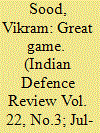

|
|
|
| 20 |
ID:
116625
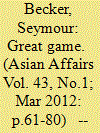

|
|
|
|
|
| Publication |
2012.
|
| Summary/Abstract |
The phrase "The Great Game" was first used in the context of Russia and Central Asia by the ill-fated Captain Conolly in 1840. For Conolly, the game metaphor signified a contest in which the Russians were Britain's potential opponents, while the Central Asians were her immediate ones. Indeed Conolly, like Thorburn, a later writer, seems even to have envisaged Russia as Britain's partner in the work of civilizing Asia. Boulger, tried to use the phrase to signify Anglo-Russian confrontation but interestingly the phrase was little used in the literature on Central Asia until Kipling's "Kim" endowed it with a popularity and the implication of great power rivalry which it had not previously enjoyed. In fact widespread use only came after the Soviet invasion of Afghanistan in 1979, though "The Great Game" is now in ever more frequent use to signify American/Russian rivalry. Kipling's use has triumphed over Conolly's.
|
|
|
|
|
|
|
|
|
|
|
|
|
|
|
|
|
|
|
|
|